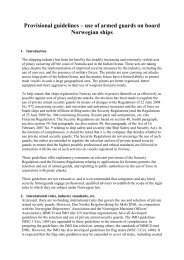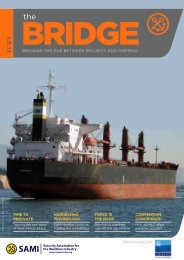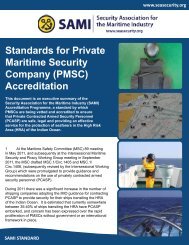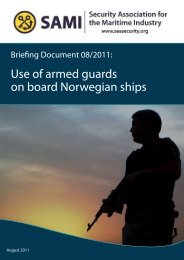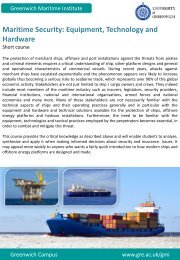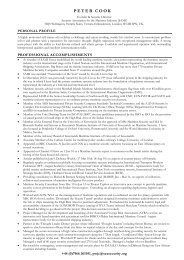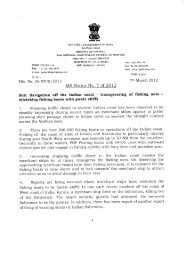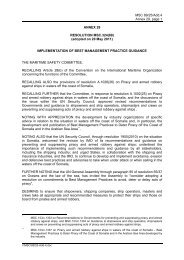SAMI Briefing Maritime Labour Convention FAQs and Text March 2013
SAMI Briefing Maritime Labour Convention FAQs and Text March 2013
SAMI Briefing Maritime Labour Convention FAQs and Text March 2013
Create successful ePaper yourself
Turn your PDF publications into a flip-book with our unique Google optimized e-Paper software.
Conditions of employment3. National laws or regulations or collective agreements may provide for compensationfor overtime or for work performed on the weekly day of rest <strong>and</strong> on publicholidays by at least equivalent time off duty <strong>and</strong> off the ship or additional leave in lieuof remuneration or any other compensation so provided.4. National laws <strong>and</strong> regulations adopted after consulting the representativeshipowners’ <strong>and</strong> seafarers’ organizations or, as appropriate, collective agreementsshould take into account the following principles:(a) equal remuneration for work of equal value should apply to all seafarers employedon the same ship without discrimination based upon race, colour, sex,religion, political opinion, national extraction or social origin;(b) the seafarers’ employment agreement specifying the applicable wages or wagerates should be carried on board the ship; information on the amount of wages orwage rates should be made available to each seafarer, either by providing at leastone signed copy of the relevant information to the seafarer in a language whichthe seafarer underst<strong>and</strong>s, or by posting a copy of the agreement in a place accessibleto seafarers or by some other appropriate means;(c) wages should be paid in legal tender; where appropriate, they may be paid bybank transfer, bank cheque, postal cheque or money order;(d) on termination of engagement all remuneration due should be paid without unduedelay;(e) adequate penalties or other appropriate remedies should be imposed by the competentauthority where shipowners unduly delay, or fail to make, payment of allremuneration due;(f) wages should be paid directly to seafarers’ designated bank accounts unless theyrequest otherwise in writing;(g) subject to subparagraph (h) of this paragraph, the shipowner should impose nolimit on seafarers’ freedom to dispose of their remuneration;(h) deduction from remuneration should be permitted only if:(i) there is an express provision in national laws or regulations or in an applicablecollective agreement <strong>and</strong> the seafarer has been informed, in the mannerdeemed most appropriate by the competent authority, of the conditionsfor such deductions; <strong>and</strong>(ii) the deductions do not in total exceed the limit that may have been establishedby national laws or regulations or collective agreements or court decisionsfor making such deductions;(i) no deductions should be made from a seafarer’s remuneration in respect of obtainingor retaining employment;(j) monetary fines against seafarers other than those authorized by national laws orregulations, collective agreements or other measures should be prohibited;(k) the competent authority should have the power to inspect stores <strong>and</strong> servicesprovided on board ship to ensure that fair <strong>and</strong> reasonable prices are applied forthe benefit of the seafarers concerned; <strong>and</strong>(l) to the extent that seafarers’ claims for wages <strong>and</strong> other sums due in respect oftheir employment are not secured in accordance with the provisions of the International<strong>Convention</strong> on <strong>Maritime</strong> Liens <strong>and</strong> Mortgages, 1993, such claims shouldbe protected in accordance with the Protection of Workers’ Claims (Employer’sInsolvency) <strong>Convention</strong>, 1992 (No. 173).29



